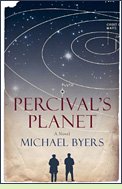|
Percival's Planetby Michael ByersReviewed by Margaret Donsbach Tombaugh joins a constellation of characters, mostly fictional, who converge on the Observatory over the course of the novel. Alan Barber is a Harvard student whose secret ambition is to find Planet X and also to win his wealthy friend's flirtatious, brilliant girlfriend. Felix DuPrie is the heir to a chemical conglomerate. Stymied by the multitude of options his wealth presents, he heads for the Arizona desert in a search for dinosaur fossils and a profession he can stick to. Mary Hempstead is a beautiful, fragile young woman who struggles to live gracefully despite a delusion she knows is peculiar but cannot seem to shake. Though Percival's Planet takes liberties with the history behind Pluto's discovery, altering the timing of certain events and weaving in fictional characters, it offers deep insight into the scientific process. As a novel, it shines. The main characters are likeable, passionate, sometimes misguided human beings striving to make peace with the fundamental uncertainties of life. The period is masterfully evoked, transporting readers to a time not unlike our own, when loony theories and sound ones might be indistinguishable and an economic disaster would soon alter the fortunes of many, not always for the worse. (2010; 414 pages) More about Percival's Planet at Powell's Books or Amazon.com Interview with author Michael Byers
Private Life by Jane Smiley (2010), about an astronomer's wife during the first half of the twentieth century. Review or More info at Powell's Books Doctor Copernicus by John Banville (1976), about the Renaissance astronomer who discovered the earth orbits the sun. More info Antichthon by Chris Scott (1982; titled The Heretic in the U.K.), about the Renaissance astronomer and philosopher Giordano Bruno. More info
Clyde Tombaugh: Discoverer of the Planet Pluto by David H. Levy (2006). More info Pluto and Beyond: A Story of Discovery, Adversity, and Ongoing Exploration by Anne Minard (2007). More info The Explorers of Mars Hill: A Centennial History of Lowell Observatory, 1894-1994 by William Lowell Putnam (1994). More info
Article on Clyde Tombaugh's search for "Planet X" at The Planetary Society's website Back to 20th Century: America Between the Wars
|
